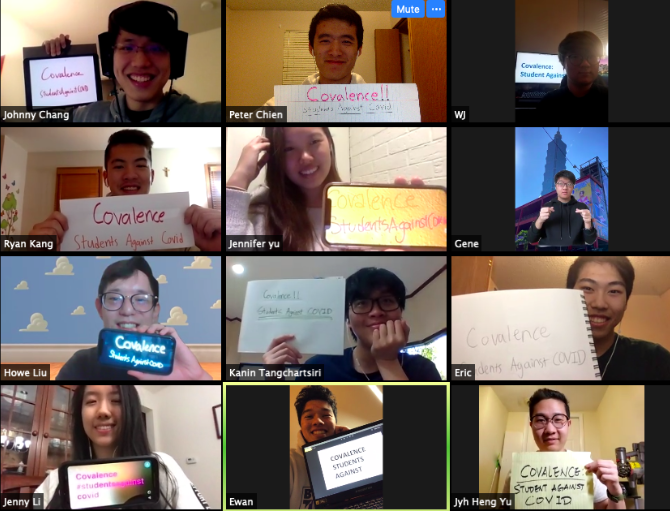Covalence: students against COVID-19
Board members of campus group Covalence hold up signs to promote their organization. Covalence was formed April 9, and its primary function is to provide aid to those affected by the pandemic.
Sep 28, 2020
Amidst the chaos of returning home last spring break for the rest of the semester, a group of students were brainstorming how they could bring their collective intuitions together in order to provide some solutions to the chaos caused by the pandemic.
Peter Chien, junior in Engineering, started bringing up the complications of the virus in the Champaign-Urbana area to his RSO Zero2One.
“We were all staying inside during quarantine, feeling useless,” Chien said. “We were doing some research: What can students do at this point? When we realized, there’s so much that we can do, especially college students. We have the skills that we need to help out.”
Chien’s motivation was matched by students in his own RSO and around campus. However, across the country, there was a severe lack of movement for students to take action against the pandemic. Students were willing to help, but they didn’t know how. Combating the complications of a pandemic on top of school responsibilities was a daunting task, and students needed guidance.
After reaching out to socially impact RSOs on campus, Covalence was born, a global movement inspiring students to work on crisis relief toward COVID-19.
Get The Daily Illini in your inbox!
The team created a Facebook group to centralize their initiative. Along with a website, Chien and others created an online community where students could share resources and opportunities related to the pandemic. More than 2,000 students joined the page.
Covalence searches for any way they can put their student resources to use. They’ve built websites for struggling small businesses, distributed PPE kits and helped the homeless find isolation centers. Covalence doesn’t look at one problem or one solution to help; they want to help everyone however they can.
Through Facebook, students at the University were able to aid a group in Cameroon that was looking to enact COVID-19 relief solutions. Thanks to their online community, they were able to provide the expertise of student web developers to build websites with the group in Cameroon.
Some students lent their time to internal projects like the pen pal program they started last semester. For students isolating from the virus, Covalence created a system that matched college students across the country to one another to share their frustrations and complications with the virus.
Jake Krumwiede, junior in Media, contracted the virus two weeks ago and has been self-isolating in a hotel room off-campus. While Krumwiede isn’t a part of Covalence, he and other students who have tested positive have thought of helpful resources the University should create having gone through the 14-day quarantine period.
“I do think there should be some way of getting a statistic and name of what students are no longer at risk so that establishments that are struggling can open their doors and get back to a sense of normalcy,” Krumwiede said.
The acts of service Covalence provides spans a wide range. The group recognized that not every student could offer their help nationally, so Covalence created an excel sheet to centralize all local opportunities to help.
“If you want to join an existing effort, here’s a list of things you can hop on right away,” Chien said. “If you want to start your own project, here’s a list of problems that we already did research for you on. And here’s a list of solutions that already exist that you can emulate within our own communities.”
For six months, Covalence has continued to search for how they can lend their help to the crisis the pandemic has created both locally and globally. From volunteering to partnered events, the initiative created a lot of ground to be covered.
“This whole COVID situation has lasted so much longer than a lot of us anticipated, a trend we’ve noticed among students and even ourselves is the drive to do something about it has faded away, we’re kind of exhausted from it,” Chien said.
With the University’s lockdown recently lifted, students are exhausted, searching for activities to take their mind off the concerns for positives tests that clouds their optimism.
Hans Stilp, junior in LAS, found himself stuck in a mental rut. Downtrodden from the all too familiar surroundings of the walls of his room, Stilp motivated himself to find a new hobby.
“I just started running since I can’t really do anything,” Stilp said. “I started a week ago and days where it hasn’t rained I’ve been averaging 10 miles a day. My calorie counter is at like 4,500 calories a day.”
The escape from a mindset focused on not contracting the virus has resulted in students distracting themselves with other forms of work, whether it be volunteering or going for a daily run.
While the impact of Covalence has lessened due to students being back in the full swing of a college semester, the initiative that the group started within the Champaign-Urbana community will continue to create relief for the pandemic for as long as the need is there.
“The fact that we actually did it, will help us in the future to take action against group efforts that students need to unite to do,” Chien said.






